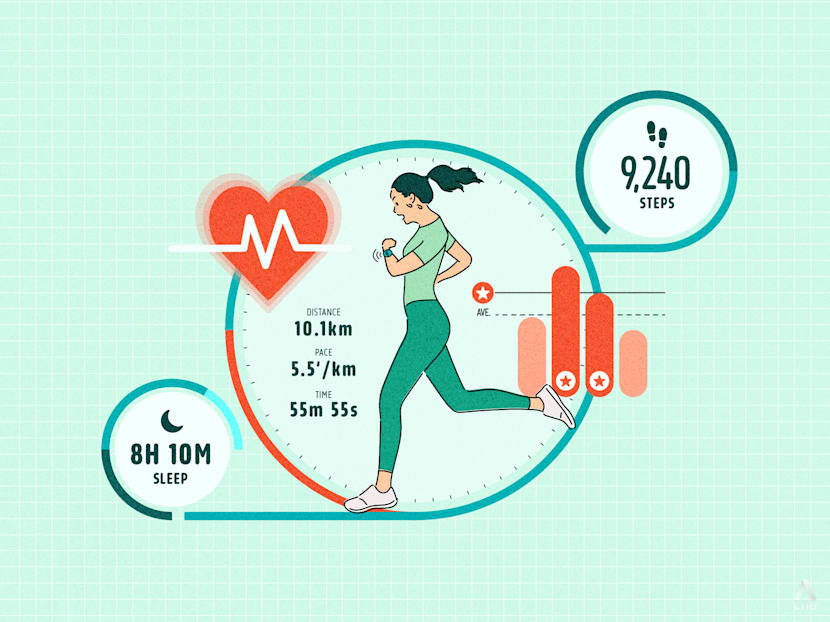Why are so many people turning their health and fitness efforts into a numbers game?
From step counts to sleep scores, the pursuit of self-optimisation can backfire, leading some to lose joy in the very activities they track.

Experts caution that over-reliance on numbers may fuel guilt, anxiety, and obsessive self-monitoring. (Illustration: CNA/Samuel Woo)

This audio is generated by an AI tool.
At 2am, when most of Singapore is asleep, John Lim laces up his running shoes, straps on his smart watch, and heads out for a trail run.
"Looking at my run data always makes me feel good, no matter how the run went," the 21-year-old student said. "I look back at my run data more like a journal entry – just a record of a nice run I did that day."
Mr Lim runs up to five times a week, clocking as much as 60km in total when his schedule allows. He tracks his pace, heart-rate and distance.
"For me, the key metrics matter most because they help me see my progress and improvement over time. I still like to keep track of my personal records, but I’m not too serious about it," he said.
Rather than feeling burdened by the numbers, he sees them as part of a routine that supports his well-being.
"I’ve never had issues where tracking made me feel pressured," he said.
"My watch even prompts me to rate my happiness from 1 to 10 after each run, and honestly, I think that’s one of the most meaningful metrics."
Still, Mr Lim knows that not everyone has the same relationship with data and knows of people who feel mentally burdened by their own tracking.
From sleep cycles to step counts, heart-rate to hydration – everything is trackable now. The question is: Are these metrics truly helping us improve, or are they quietly adding to the pressure to perform?
WHY WE LOVE TRACKING
Tracking is now deeply embedded in our lives, driven by a culture that prioritises self-improvement and optimisation.
Ms Eileen Goh, a therapist at therapy platform Talk Your Heart Out said: "We live in a hustle culture that values self-improvement and optimisation. Many people turn to tracking as a way to feel more in control, especially when the state of the current world is out of our control."
We live in a hustle culture that values self-improvement and optimisation. Many people turn to tracking as a way to feel more in control, especially when the state of the current world is out of our control.
In times of uncertainty, tracking offers a sense of stability, transforming the intangible aspects of our physical health into measurable data.
This visibility is motivating as our brains are also wired to seek measurable progress, and data-driven results allow us to visualise our achievements.
Dr Geraldine Tan, principal psychologist at The Therapy Room, added that "people love data".
"We have all grown up with statistics and graphs in our maths classes, and we know how to read them."
The visual feedback from numbers and graphs offers a rewarding sense of accomplishment, providing motivation and a chance to celebrate small wins that might otherwise be overlooked, said Ms Goh.
Tracking can even play a key role in behavioural change. Dr Elsa Tan, a clinical psychologist at Heartscape Psychology, said that self-monitoring, a key component of cognitive behavioural therapy, helped increase self-awareness and identify patterns.
"When people track their health or hobbies, they are self-monitoring. (These tracking apps) allow users to move forward by breaking down large goals into smaller, more actionable steps," she said.
This continuous feedback loop enables individuals to identify patterns and adjust their behaviour.
THE NEED TO SHARE
Sharing your progress has become just as popular as tracking itself.
Many apps allow users to see how they measure up against others.
"This not only provides a sense of community, but also helps people to keep tabs on how they are doing and whether they are performing well, which is also positively reinforcing," said Dr Elsa Tan.
The act of sharing often stems from a deeper need to establish one's identity. "Human beings are social animals," Dr Elsa Tan said. "The impulse to share completed activities likely stems from a desire to establish our status within a relevant social group. It is also a way to curate our own identity to others – 'I am a runner,' for example."
When these posts receive likes and comments on social media, they provide social validation, reinforcing a sense of accomplishment.
Sharing also plays a key role in affirmation and accountability. "When we accomplish something, we want to put it out there for people to affirm," Dr Geraldine Tan explained.
"Affirmation helps to guide us toward a certain direction." This way, sharing not only boosts motivation but also creates a system of accountability, with progress posts encouraging continued effort, she said.
CHASING THE WRONG GOAL
Experts said that tracking turns harmful when the goal shifts from qualitative measures of well-being to rigid, external, quantitative metrics.
Dr Elsa Tan cautioned: "When your life starts to revolve around the activity, it is a sign that the app is in the driver’s seat of your life."
Signs of unhealthy tracking can manifest mentally, emotionally and behaviourally.
Ms Goh pointed out common warning signs:
- Overwhelming guilt when the data doesn’t hit the goal.
- Feeling lost without the aid of tracking for an extended period of time.
- Obsessively monitoring and comparing with the results of others.
- A rigid mindset of following the tracker even if it conflicts with your physical, emotional or social needs.
The enjoyment of an activity can fade when it becomes something that must be measured or optimised.

Emotionally, Dr Elsa Tan noted that there may be a disproportionate amount of guilt and anxiety from missing a workout or seeing a dip in a metric.
For some, this guilt may turn into feelings of dread when preparing for or doing the activity.
Behaviourally, users may force themselves to engage in the activity despite not wanting to and skip social events and obligations to prioritise completing an activity. In extreme cases, this can lead to physical injuries and deterioration, often more apparent to family members before the individual recognises the problem themselves.
PRICE OF PERFECTION
"Tying self-worth to numbers can start to overshadow the meaning and intent of tracking," said Ms Goh. Instead of being a helpful tool, tracking becomes an "internal critic", reinforcing unhealthy mindsets of perfectionism or comparison.
The emotional toll can be exacerbated by social comparison. "It can create guilt around slowing down or taking a break because rest doesn’t always reflect in data," she explained.
This pressure for constant achievement can lead to feelings of inadequacy, especially in a modern society that glorifies relentless productivity.
This tendency to overanalyse and overcorrect shows up clearly in one of the most common areas people try to optimise via tracking: sleep.
It's common for people to have trouble with falling asleep, staying asleep or waking up too early, said Dr Geraldine Tan. But while trackers promise solutions, they can sometimes have the opposite effect.
Detailed insights into REM cycles, oxygen levels and sleep quality can lead to overanalysis, especially for those already anxious.
"Anything they think deviates from the normal, they perceive as something they need to fix or a problem they need to solve," said Dr Tan. This heightened scrutiny often becomes counterproductive – turning bedtime into a stressful, tedious process instead of a restorative one.
Tracking can also foster secrecy and shame. Dr Geraldine Tan has observed patients curating what they share about their eating habits, hiding or modifying their tracking to avoid judgment.
In some cases, obsessive tracking can spiral into compulsive behaviour, particularly around exercise or diet.
"Rigid, inflexible adherence to general app-based formulas can lead to significant negative consequences," Dr Elsa Tan warned. "Users may push themselves beyond safe limits, increasing the risk of injury or burnout."
RECLAIMING BALANCE
To regain a healthier relationship with tracking, experts offer several suggestions:
1. Step back and assess
Ms Goh recommends pausing to assess how you feel without the metrics. "The break can provide some clarity on whether it’s enhancing your life or holding you hostage." Viewing the data with curiosity, rather than as a measure of success, can help shift the focus back to personal growth instead of external validation. The qualitative experience – how you feel – should hold as much weight as the numbers.
2. Clarify intention
Dr Geraldine Tan emphasised the importance of understanding why you're tracking in the first place. Shifting your mindset from external pressure to internal motivation can realign your focus on personal goals.
3. Put data back in its place
Tracking apps should serve you, not the other way around, said Dr Elsa Tan. Consider taking breaks from tracking or disabling social sharing and streak counters. Instead of focusing on specific outcomes – like running 5km – set process-based goals – such as staying active for 15 minutes. If tracking becomes overwhelming, professional support may be necessary.
When our sense of worth is solely tied to numbers, we lose sight of a life that feels meaningful, not just measurable.
"There is no such thing as a perfect routine," said Ms Goh. "There is only 'good enough.'" Reclaiming our mental well-being means stepping back from the metrics and finding joy in the process, not just the results.














